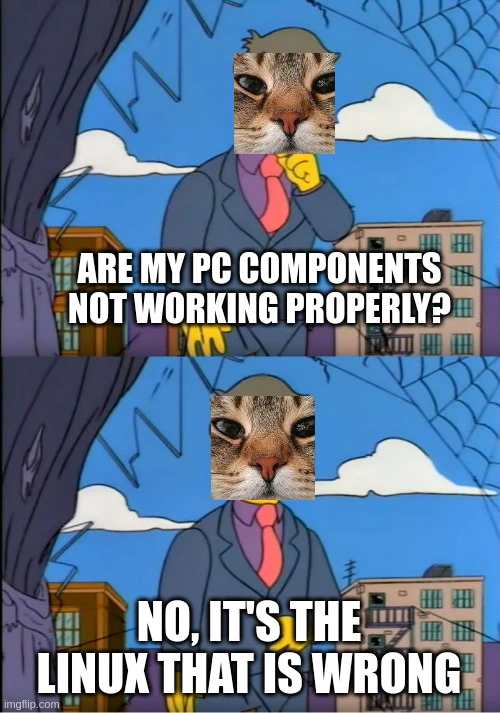Agreed. It's really shit for new code, but if I'm writing glue code stuff or repetitive code it saves a lot of time spent on typing.
Well, no yummy Wienerschnitzel for you then!

I remember navigating for my dad as a kid using a physical street map. It was a great feeling tracking your position on the map and telling the driver what turn to make next.
But nothing beats the convenience of having a small rectangle that automatically calculates routes for you, especially when travelling alone.
Going to concerts with earplugs is great.
Even if the music is loud I can always hear the people next to me and the music still sounds good.
Never going to review on Steam again.
I've put some big effort into a select few reviews a few years ago and some cunt copied and pasted them entirely to repost them on the same game.
I reported it multiple times but no action was taken, so yeah.
While he advocates for it, that's also a point that Martin brings up multiple times when he talks about his project "fitnesse".
Basically saying that they left it open how stuff can be saved, but the need has never arisen to actually pivot to a different system.
Waiting for the army of swifties to singlehandedly take down ISIS
It somehow uses a lizard if you say jizard.
Bonus actual Jizard:
Ohne das jetzt genauer nachgeforscht zu haben, könnte man das seitens Lemmy richten
I'll take my mentally stable wife scrolling Instagram stuff daily over my nutcase ex that I could game with.
My point is sematics.
You can style your whole webpage with divs, but using main, nav, footer or whatever blocks is semantically more correct, because you group elements together that have a certain purpose.
A HTML Tag in the middle of a sentence is not wrong per se, but when parsing it a line break could signify two sentences where one has missing punctuation, instead of a complete sentence as your original intention was.
I don't really care how the design you want is achieved to be honest, but I don't get why the prof didn't argue against.
Oh boy.
We had a class in the first semester of uni where we had to create a static html page based on a screenshot.
There was this one textbox at the top of the site, where the only way you could recreate the screenshot was by using a <br/> in the middle of the text.
The prof was very picky about your HTML being semantically thorough and correct, so that was super weird that that was necessary.
That worked quite well, haha 😄
This is tragically beautiful.
Did you copy paste this from somewhere?
When I try to debug an issue on the OS side after a kernel update but it's fixed by unplugging the power cable for a few minutes.


Totally not based on a true story.
I had to design a simple general purpose language for university, so I tried creating "ZoomerScript" with Jetbrains MPS


Insert <it's not much but it's honest work> meme. It only supports ints and bools, some logic and simple arithmetics and it compiles to Java but damn was it hard to get that far.
Can you guess what everything does?
Any C# devs want to share their setup?
As the title says, you probably guessed it already. For work I mainly develop on the .NET platform using a Windows device, but at home I enjoy all the benefits of a good OS.
Now I kinda want to get my C# skills "sharper" and have some projects in mind utilising it, but I'm a bit miffed about the development tools and possibilities of deployment available for me on Linux.
Also I may want to coerce my boss to let me work on a device with my OS of choice.
Any advice from devs that are in a similar spot? What do you use for .NET development on Linux? And are there any cool multiplatform deployment possibilities (next to Xamarin/Maui) that actually let me build natively on Linux?
So I installed EndeavourOS ...
... and I absolutely love it.
After my previous post where I asked for advice on distros I have tried Mint and EndeavourOS first as VM's and afterwards I gave them their own partition and tried it on my real hardware.
Something about EndeavourOS just sat right though and I promptly replaced my windows install with it. KDE Plasma also blows me away with the amount of customisation that is possible.
I've spent some time configuring today but mostly aesthetic stuff as my hardware worked 95% out of the box. Some odd dependencies were missing for steam to work properly but I'm really not missing anything that windows had right now.
I'm curious how my uni workflow will look like now, but I'm sure I can make it work.
Thanks a lot for the support and advice you've given me. I really love the community on here.
I'll get back to customising my bash prompt now. 😄
Edit: Due to popular demand:
I use Arch, btw.
Which distro is the right one for me?
Hey guys, I'm an entry-level IT professional and tech enthusiast.
I'm getting a bit sick of windows for a multitude of reasons and want to try out some Linux distros.
I use my pc for web browsing, university (which uses office 365) where I study software design, software development (vs code, visual studio, jetbrains stuff) and gaming (99% of the time via steam).
My main concerns for switching are that I'll have a hard time with university work because we mostly use teams for video conferences and work together with word, and other office stuff. We also are required to do some virtual machine stuff where we use virtualbox.
Also I'm a bit worried that some games on uplay, epic and other platforms aren't available anymore.
For distros I've been mainly looking at Manjaro, Linux Mint or plain old Ubuntu. Can you recommend anything that might fit for me or will I maybe run into any issues with my chosen three?
Edit: Thanks a lot for all the replies. I've read through all of them even if I didn't reply and it was very helpful. I will test most of your suggestions in a VM before I jump into completely changing my OS. And I'll probably try booting from a USB Drive first. What I didn't mention is that I've already worked with Ubuntu, Debian and CentOS, so I'm not scared about having to use a CLI.




